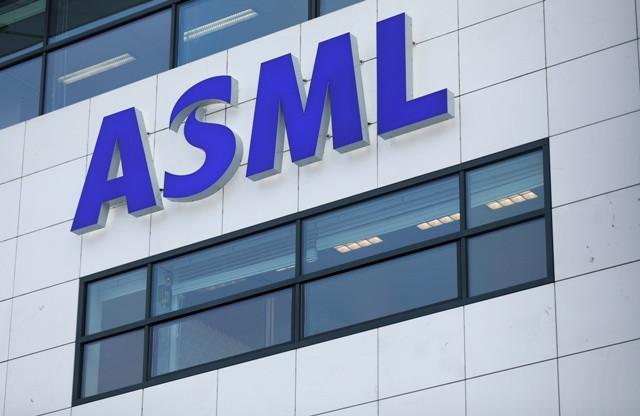ASML, the Dutch chip equipment maker, has revealed that U.S. export restrictions are significantly impacting its sales in China, leading to a downward revision of its 2025 financial outlook. In its earnings report released Tuesday, ASML projected net sales for 2025 to fall between 30 billion and 35 billion euros ($32.7 billion to $38.1 billion), aligning with the lower end of its previous guidance. This adjustment comes amid geopolitical tensions and rising pressure on the global chip supply chain, prompting investor concerns and a substantial market response.
The company's shares plummeted by as much as 16% on Tuesday, wiping out over $50 billion in market capitalization. This sharp decline was exacerbated by weaker-than-expected net bookings, which reached just 2.6 billion euros ($2.83 billion), far below the 5.6 billion euro consensus estimate from analysts. While ASML's third-quarter net sales of 7.5 billion euros exceeded expectations, the disappointing bookings highlighted concerns over its future sales, especially in China.
ASML Chief Financial Officer Roger Dassen addressed these concerns during a call with analysts, acknowledging that China's sales would likely decline next year due to U.S. export controls. "We all see that there is speculation around export control," Dassen remarked, noting that this was a factor in the company's more cautious outlook for Chinese revenue in 2025.
China has been a crucial market for ASML, accounting for 29% of its sales in 2023. However, as U.S.-led restrictions tighten, ASML expects that contribution to drop to around 20% by 2025. In an effort to bypass these restrictions, Chinese firms have been stockpiling ASML's deep ultraviolet (DUV) lithography machines, which, while less advanced than the company's extreme ultraviolet (EUV) systems, are still vital for manufacturing chips used in a wide range of electronic products. The rush to buy these machines has temporarily boosted ASML's sales, but with export controls in place, future sales prospects remain uncertain.
The Dutch government has expanded export restrictions, now requiring licenses for the sale and maintenance of ASML's equipment to Chinese customers. This move, which took effect in September, effectively limits ASML's ability to service or sell new DUV machines in China, further straining the company's business outlook in the region. Analysts from UBS project that ASML's China-related revenue could fall by as much as 25% to 30% in 2025 due to these restrictions.
Abishur Prakash, founder of the advisory firm The Geopolitical Business, explained that ASML's reliance on China makes these export controls particularly impactful. "For ASML, it is watching what is taking place with China as a potential restriction on business," he noted, adding that the demand for ASML's machines could diminish not just in China but globally as geopolitical tensions reshape the chip industry.
The ripple effects of these restrictions are already evident. Analysts at Bank of America estimate that ASML's forecast, which sees China contributing around 20% of its revenue by 2025, implies a steep 48% year-over-year revenue decline in the Chinese market. This is a much sharper drop than the 3% previously anticipated by the bank's analysts.
ASML's stock, which once soared to an all-time high of over 1,000 euros per share in July, has been hit hard by the revised guidance and broader market dynamics. The share price fell by nearly 5% again on Wednesday, adding to concerns among investors and analysts who now question whether ASML can sustain its growth trajectory in the face of escalating geopolitical risks.
Despite the challenges, some industry observers remain cautiously optimistic. Chris Miller, an assistant professor at Tufts University and author of Chip War, pointed out that the restrictions might have ironically benefited ASML in the short term as Chinese companies accelerated their purchases of older DUV technology. However, as these controls tighten further, ASML's sales are expected to "trend towards more historically normal percentages," as Dassen noted.
Investment firm Aureus has already adjusted its holdings in ASML, reducing its stake in August over concerns about the company's valuation and the potential decline in orders from China. Han Dieperink, Aureus' chief investment officer, warned that customer delays might be a tactic to negotiate better prices from ASML, potentially squeezing the firm's margins further.





